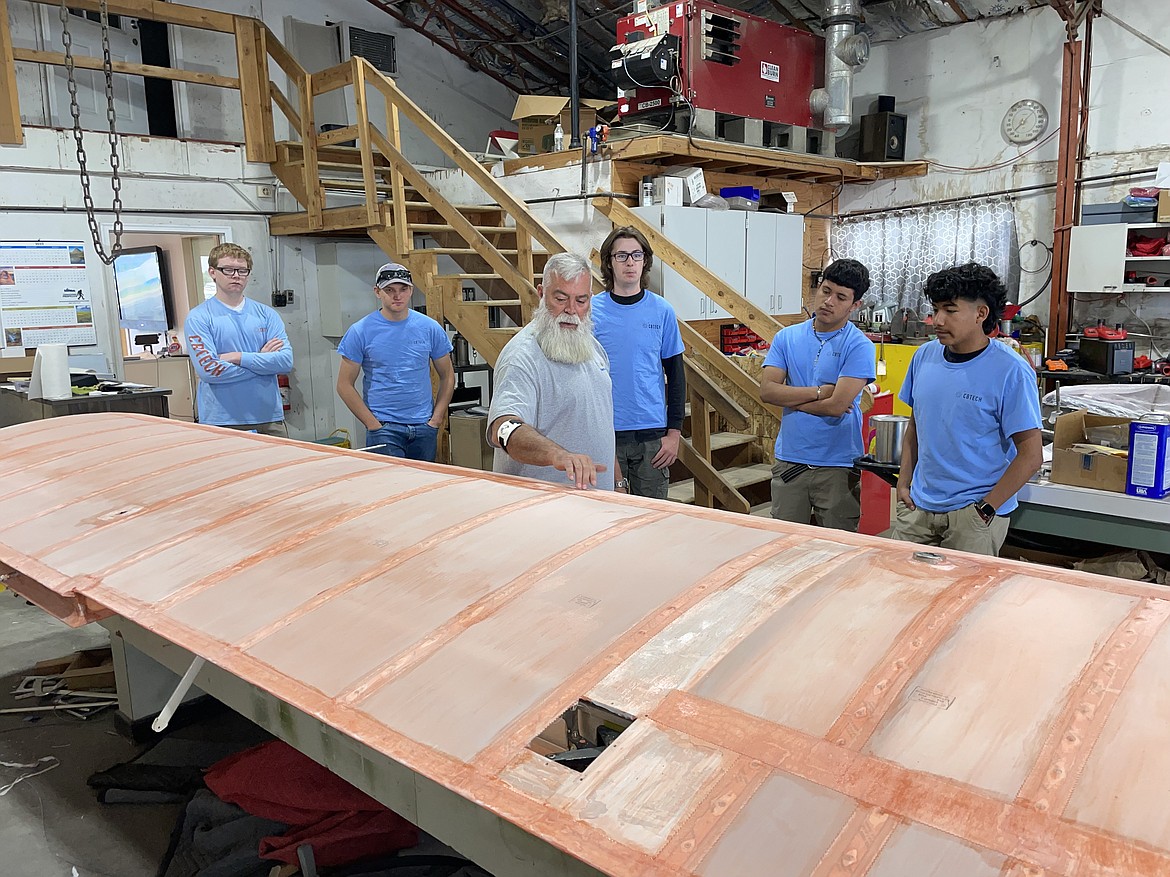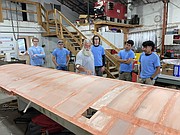Rod Richeson: Aviation expert has his head in the clouds
Not long after getting his nursing degree, Rod Richeson learned something important about himself.
“I’m not a good employee,” he said. “I kind of need to be the one in charge, making the decisions. And I just couldn’t see how I was ever going to move into that position as a nurse.”
So it’s just as well Richeson now owns two businesses — Blue Sky Aviation, a Federal Aviation Administration-certified repair station that specializes in repairs and upgrades to small, general aviation planes, and Basin Technical Services, which supplies IT services to the Port of Moses Lake and the Grant Transit Authority — and is the boss at both of them.
However, he doesn’t mind getting his hands dirty either, and visiting Richeson on a Wednesday afternoon found him bending over the open hood of a Toyota Prius, trying to replace a valve deep in the engine, a puddle of pink coolant having oozed all over the floor.
“I may have to come back to this,” he said after several minutes of struggle.
The Prius sits next to a nearly gutted 1973 Cessna 182P, which Richeson is upgrading from the old mechanical controls — gauges and dials — to a pair of flat panel instrument screens. It may look fancy and high tech, but Richeson said that new displays and controls he installs on private aircraft like the Cessna sitting in his hangar are nowhere near as sophisticated as those in Prius.
“What’s new in aviation is 20 year old technology and computers,” he said. “Garmin, which is probably the leader in aviation in avionics, in the last five or six years they’ve just implemented the CAN bus, the physical way that all the pieces are connected and can talk to each other.”
By comparison, Richeson notes that his 2001 VW Jetta has a CAN bus, a central controller technology developed in the 1980s and used as a controller in everything from model railroads to teleprompter systems to prosthetic limbs and, of course, cars and airplanes.
This place where computers meet engines is an easy place for Richeson to work, given all his experience as both a mechanic and IT manager. Because virtually everything new with an engine also has at least one computer, and possibly a mess of electronic sensors, helping that engine run more efficiently.
“I’ve been through this stuff before,” he said. “The IT background has played very well into the avionics of this era right now.”
There’s not an awful lot Richeson hasn’t done. Aircraft mechanic, business owner, commercial pilot, nurse, IT manager. He’s also the current president of the Moses Lake branch of the Washington Pilots Association, a newly appointed member of the commission that oversees management of the small Moses Lake Municipal Airport and a longtime host of foreign exchange students. He’s also decided to get involved with the new aeronautics program at the Columbia Basin Technical Skills Center.
Because Richeson believes there’s a bright future for aviation in Moses Lake.
“I have a passion for aviation, flying and fixing,” he said. “I have a wonderful wife who is a dentist here in town. That gives me a little bit more opportunity to really pursue my passion. It also gives me a little extra time to help make our community better.”
Richeson said he learned to fly before he learned to fix airplanes, though as a teenager, he was always fixing something — Volkswagen cars, snowmobiles — and so when his family relocated to Moses Lake, he earned an associate’s degree at Big Bend Community College in the aircraft maintenance program.
It’s one of a handful of associate’s degrees Richeson has earned over the course of life.
“I have a master’s degree in associate’s degrees,” he joked.
But it points to a bigger commitment Richeson said he has. If aviation is going to have a bright future in the region, he said it will also need people to do the work of building, fixing, testing and flying those airplanes. A lot of that work pays well and doesn’t require students to attend faraway universities and acquire tens or even hundreds of thousands of dollars of debt to gain those skills and get employed.
“Not everybody’s meant to go to a big university,” Richeson said, adding that he has two university-educated daughters, one of whom went to law school. “I think that there’s been a huge push from all sides to go to university to get this education. And I think there’s a lot of kids that could be just as happy or happier in a skilled trade.”
When Mitsubishi Aircraft was busy testing the SpaceJet regional jet here in Moses Lake, Richeson said he saw a lot of people he knew get their associate’s degrees from BBCC and go straight into jobs that paid very well for anywhere, but especially for Moses Lake. It made finding help in a small shop like Blue Sky Aviation difficult, he said, since the $17 per hour he offers mechanics couldn’t compete with the $30-$35 an hour Mitsubishi could pay, but it will probably be good for the region in the long run.
“It’s unfortunate how that came undone,” Richeson said. “But it also created a pool of talent here that is enticing to anybody that wants to do an aviation-related activity.”
Mitsubishi partnered with Seattle-based AeroTEC to test and certify the roughly 100-passenger SpaceJet, Japan’s first domestically produced airliner since the early 1970s. The company halted testing on the SpaceJet in 2020, largely in response to the COVID-19 pandemic, and while the planes are still stored in a hangar at the Port of Moses Lake and Mitsubishi Heavy Industries says it remains committed to the program, the company has slashed the development budget for the SpaceJet and laid off most of its employees.
Richeson said the current situation for aviation companies is tight because there simply aren’t enough pilots or mechanics to do the work that’s out there right now. He expects with the growth coming in the industry there will be lots of work — steady, stable, secure work — for years to come for anyone who can fly or fix airplanes. In fact, Richeson said last year, during a visit to St. George, Utah, he was offered an avionics manager position with a company there.
“It’s an excellent career path. You know, everywhere you go in the United States today, you could find a job working in aviation,” he said.
“There’s not enough bodies to do the work that needs to be done to even support our current level of activity. So if we get any growth, there’s just not enough people to ramp up the maintenance side of it to keep up if we get any growth,” Richeson added.
Which is why he believes it is important to support local technical education. Because Richeson says he’s the perfect example of someone with a vocational and technical background who has done very well for himself, and has found a way to encourage others and give back to the community.
“I’ve had people ask me, wow, why are you so successful? I don’t really know. I don’t have any secret, except two things: work really hard, and don’t take no for an answer,” he said.



